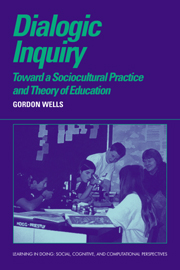Crossref Citations
This Book has been
cited by the following publications. This list is generated based on data provided by Crossref.
Beach, Richard
2000.
Critical Issues: Reading and Responding to Literature at the Level of Activity.
Journal of Literacy Research,
Vol. 32,
Issue. 2,
p.
237.
Teasdale, Alex
and
Leung, Constant
2000.
Teacher assessment and psychometric theory: a case of paradigm crossing?.
Language Testing,
Vol. 17,
Issue. 2,
p.
163.
Lacasa, Pilar
2000.
Hacia una nueva escuela: creencias y actividades del profesorado.
Cultura y Educación,
Vol. 12,
Issue. 1-2,
p.
11.
Nuthall, Graham
2000.
The Role of Memory in the Acquisition and Retention of Knowledge in Science and Social Studies Units.
Cognition and Instruction,
Vol. 18,
Issue. 1,
p.
83.
Lantolf, James P.
2000.
Second language learning as a mediated process.
Language Teaching,
Vol. 33,
Issue. 2,
p.
79.
Gergen, Kenneth J.
2001.
Psychological science in a postmodern context..
American Psychologist,
Vol. 56,
Issue. 10,
p.
803.
Sawyer, Richard D.
2001.
Teacher decision-making as a fulcrum for teacher development: exploring structures of growth.
Teacher Development,
Vol. 5,
Issue. 1,
p.
39.
Kinginger, Celeste
2001.
i +l #ZPD.
Foreign Language Annals,
Vol. 34,
Issue. 5,
p.
417.
González, Norma
Andrade, Rosi
Civil, Marta
and
Moll, Luis
2001.
Bridging Funds of Distributed Knowledge: Creating Zones of Practices in Mathematics.
Journal of Education for Students Placed at Risk (JESPAR),
Vol. 6,
Issue. 1-2,
p.
115.
Galda, Lee
and
Beach, Richard
2001.
Response to Literature as a Cultural Activity.
Reading Research Quarterly,
Vol. 36,
Issue. 1,
p.
64.
Garrison, D. Randy
Anderson, Terry
and
Archer, Walter
2001.
Critical thinking, cognitive presence, and computer conferencing in distance education.
American Journal of Distance Education,
Vol. 15,
Issue. 1,
p.
7.
Van Oers, Bert
and
Hännikäinen, Maritta
2001.
Some Thoughts About Togetherness: An introduction Re´flexions sur e Togetherness f Algunos Pensamientos Sobre el "Sentimiento de Unio´n".
International Journal of Early Years Education,
Vol. 9,
Issue. 2,
p.
101.
Bloomer, Martin
2001.
Young Lives, Learning and Transformation: Some theoretical considerations.
Oxford Review of Education,
Vol. 27,
Issue. 3,
p.
429.
Barton, Keith C
2001.
A Sociocultural Perspective on Children’s Understanding of Historical Change: Comparative Findings From Northern Ireland and the United States.
American Educational Research Journal,
Vol. 38,
Issue. 4,
p.
881.
Lemke, J. L.
2001.
Articulating communities: Sociocultural perspectives on science education.
Journal of Research in Science Teaching,
Vol. 38,
Issue. 3,
p.
296.
Edwards, Anne
2001.
Researching pedagogy: a sociocultural agenda.
Pedagogy, Culture & Society,
Vol. 9,
Issue. 2,
p.
161.
Mejía-Arauz, Rebeca
2001.
El desarrollo de la intersubjetividad y la colaboración.
Cultura y Educación,
Vol. 13,
Issue. 4,
p.
355.
Delandshere, Ginette
2002.
Assessment as Inquiry.
Teachers College Record: The Voice of Scholarship in Education,
Vol. 104,
Issue. 7,
p.
1461.
Mayer, Connie
Akamatsu, C. Tane
and
Stewart, David
2002.
A Model for Effective Practice: Dialogic Inquiry with Students who are Deaf.
Exceptional Children,
Vol. 68,
Issue. 4,
p.
485.
Shah, Farhana
Evens, Martha
Michael, Joel
and
Rovick, Allen
2002.
Classifying Student Initiatives and Tutor Responses in Human Keyboard-to-Keyboard Tutoring Sessions.
Discourse Processes,
Vol. 33,
Issue. 1,
p.
23.



